 |
||
|
||||||||||
| About Us | ||||||||||
|
||||||||||
| Schedule Appointment | ||||||||||
| Help For Your Health | ||||||||||
|
||||||||||
| Testimonials/Success Stories | ||||||||||
| Our Blog | ||||||||||
 Yelp About Us Yelp About Us |
||||||||||
| Newsletter Archives | ||||||||||
| Resources and Links | ||||||||||
| FAQs | ||||||||||
| Home |
Food Tips for Your Health
Medicine | Medicine & Food | Fuel for Thought | Moderation | Preacher’s Practice | Relax |
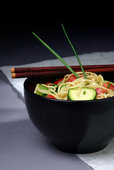 Food is Medicine, Medicine as Food
Food is Medicine, Medicine as Food
We eat every day, usually as many as 3-5 times a day. From work to exercise, from reading a book to watering the garden, from school to lounging on the sofa, food provides the fuel for our bodies to do all the activities we do in our daily lives. For some of us, eating is an integral part of our existence – we plan our days around our meals and make an effort to provide the highest quality fuel for our bodies. For some of us, eating is a bother – meal planning and preparation is just another thing which must be done in an already over filled day. Many of us fall in the middle of these two extremes. We enjoy a good meal, but don’t really think much about WHY we need the meal. Eating is pleasurable; food preparation is a necessary task. Fast food or frozen dinners are a reasonable way to get the job of filling the belly done with a minimal amount of fussing, and they taste good enough.
Most of us don’t think much about why we need to eat beyond the fact that we are feeling hungry. We may notice that we feel really good after eating some foods, and really bad after eating others, but we often don’t think about it enough to consider that maybe there is a pattern. We notice when we are too hungry or too full, but the sensations in between tend to be missed. Some of us are taking medications and have been told to avoid certain foods such as grapefruit or leafy greens while taking the drugs. WHY would a FOOD be something to avoid while taking a DRUG?!
 Our bodies are made up of a variety of chemicals (mostly carbon, oxygen, hydrogen, and calcium) which interact together in certain ways to give us physical structure and to allow all of our physiological processes to work. Medications are made up of chemicals which have effects on the chemicals in our bodies. Foods are also made of chemicals, and they also have an effect on the chemicals in our bodies. Whether a food is “good” for you or “bad” for you is generally a factor of whether the interaction with your particular body chemistry is favorable (you feel good), or not. back to top
Our bodies are made up of a variety of chemicals (mostly carbon, oxygen, hydrogen, and calcium) which interact together in certain ways to give us physical structure and to allow all of our physiological processes to work. Medications are made up of chemicals which have effects on the chemicals in our bodies. Foods are also made of chemicals, and they also have an effect on the chemicals in our bodies. Whether a food is “good” for you or “bad” for you is generally a factor of whether the interaction with your particular body chemistry is favorable (you feel good), or not. back to top
Chinese Medicine and Food
Chinese Medicine has a rich history of considering diet to be one root cause of disease. Many digestive disorders and sleep disturbances are believed to be at least partly due to eating the wrong foods at the wrong times, or eating too little of the right foods. The earliest books about Chinese internal medicine recommend changing the diet first, before giving medications. Many Chinese herbs are used in day to day cooking, and many Chinese families have their own secret recipes for longevity tonics, prevention of common cold, “female” issues, post-partum nourishment, and other uses. The herbs most commonly found in these tonics are also found in many Chinese dishes.
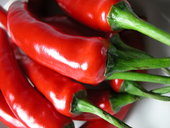 Chinese Medicine considers the food, the season, and the individual’s constitution when making decisions about dietary changes. As the theory goes, if you are too damp, avoid foods which are damp in nature and eat foods which are drying. If you are too dry, eat foods which are moistening and avoid foods which are drying. For someone who goes surfing a lot in winter and often feels cold, warming foods containing cinnamon, cloves, cardamom, meat, or chili peppers may be recommended. For someone who has hot flashes and is uncomfortably warm in the summer, mint tea or watermelon may be recommended. For someone who is suffering from a runny nose and body aches, a broth of miso with scallions and ginger may be just the thing to help them feel better. Honey baked pears may help to soothe a dry cough, and eating 2-3 stalks of celery per day may reduce high blood pressure for some people. back to top
Chinese Medicine considers the food, the season, and the individual’s constitution when making decisions about dietary changes. As the theory goes, if you are too damp, avoid foods which are damp in nature and eat foods which are drying. If you are too dry, eat foods which are moistening and avoid foods which are drying. For someone who goes surfing a lot in winter and often feels cold, warming foods containing cinnamon, cloves, cardamom, meat, or chili peppers may be recommended. For someone who has hot flashes and is uncomfortably warm in the summer, mint tea or watermelon may be recommended. For someone who is suffering from a runny nose and body aches, a broth of miso with scallions and ginger may be just the thing to help them feel better. Honey baked pears may help to soothe a dry cough, and eating 2-3 stalks of celery per day may reduce high blood pressure for some people. back to top
Fuel for Thought (and Everything Else We Do!)
When considering the effect of food on the body, think about the fuel you put in your car. Does your BMW drive better on regular, or on premium? What happens to your engine if there is water in the gas tank? Or sand? Your body deserves at least the same consideration that your car receives when picking its fuel!
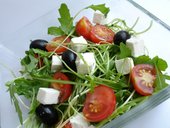 The beginning point for providing higher quality fuel for your body is to make sure you are eating plenty of fresh vegetables and fruits, preferably organically grown. Sugar and processed foods should be a treat rather than dietary staples. Food additives and artificial sweeteners should be avoided whenever possible. Proteins, carbohydrates and fats are all necessary, and should be consumed in balance. Whole grains, vegetables and fruits are better sources of carbohydrates than cookies, candy and chips. Lean meat from animals raised without added hormones and antibiotics is an excellent source of protein. Fats are best when they come from unsaturated vegetable sources such as nuts, olives, and avocados.
The beginning point for providing higher quality fuel for your body is to make sure you are eating plenty of fresh vegetables and fruits, preferably organically grown. Sugar and processed foods should be a treat rather than dietary staples. Food additives and artificial sweeteners should be avoided whenever possible. Proteins, carbohydrates and fats are all necessary, and should be consumed in balance. Whole grains, vegetables and fruits are better sources of carbohydrates than cookies, candy and chips. Lean meat from animals raised without added hormones and antibiotics is an excellent source of protein. Fats are best when they come from unsaturated vegetable sources such as nuts, olives, and avocados.
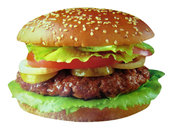 Human beings are omnivores. We are designed to consume plants and animals, and we require the nutrients in everything from leafy greens to nuts to meat to fruit. In Chinese medicine, a diet is considered to be balanced if the person eats foods from each of the five colors (green, red, orange, white, black/dark purple) and each of the five flavors (bitter, spicy, sweet, salty, sour) every day, with the balance of the colors and flavors varying by the individual constitution and the season. Interestingly, if you consume all of the five flavors and colors, you are likely to be consuming an array of vegetables, meats, and grains which gives you an astonishingly balanced diet by the standards of the west! back to top
Human beings are omnivores. We are designed to consume plants and animals, and we require the nutrients in everything from leafy greens to nuts to meat to fruit. In Chinese medicine, a diet is considered to be balanced if the person eats foods from each of the five colors (green, red, orange, white, black/dark purple) and each of the five flavors (bitter, spicy, sweet, salty, sour) every day, with the balance of the colors and flavors varying by the individual constitution and the season. Interestingly, if you consume all of the five flavors and colors, you are likely to be consuming an array of vegetables, meats, and grains which gives you an astonishingly balanced diet by the standards of the west! back to top
Moderation In All Things – Including Moderation! (or Lisa’s Dietary Advice)
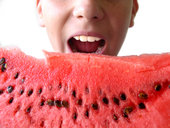 My advice for using food as medicine is as follows:
My advice for using food as medicine is as follows:
1. Avoid processed foods as much as possible, and do NOT be tempted by artificial sweeteners as a "healthy" alternative. If your great grandmother would not identity it as food, it probably isn’t!
2. Limit eating out to 2 meals per week or less. While restaurant food can be tasty and convenient, it is rarely prepared with the freshest or most natural ingredients.
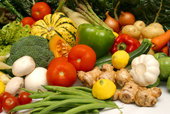 3. Whenever it is practical, eat locally grown, sustainably farmed, organic fruits and vegetables. Join a Community Sustained Agriculture (CSA) Program if there is one in your area, or shop at a local farmer's market. CSA programs are a great way to have a weekly supply of locally grown organic produce, and usually provide a much broader array of vegetables and fruits than you would pick if you simply went to the grocery store.
3. Whenever it is practical, eat locally grown, sustainably farmed, organic fruits and vegetables. Join a Community Sustained Agriculture (CSA) Program if there is one in your area, or shop at a local farmer's market. CSA programs are a great way to have a weekly supply of locally grown organic produce, and usually provide a much broader array of vegetables and fruits than you would pick if you simply went to the grocery store.
 4. Limit your baked goods to what you make at home, and make sure the ingredients used are minimally processed and organic as much as possible. Look for unbleached flour and unprocessed cane sugar from organic sources.
4. Limit your baked goods to what you make at home, and make sure the ingredients used are minimally processed and organic as much as possible. Look for unbleached flour and unprocessed cane sugar from organic sources.
5. When cooking at home, buy meats which are from animals raised without additional hormones and antibiotics, given medications only when they are sick rather than to maintain health. Animals fed an unnatural diet require more medication to maintain their health, which means more antibiotic residue in your food. The healthiest meat for us to eat comes from animals who live as close to a “normal” life as possible before they are taken to slaughter. This means grazing on pasture, not on feedlot corn! Whole Foods markets, Wild Oats markets, and Trader Joes are excellent sources of high quality hormone-free and antibiotic-free meats. If you live in an area in which sustainable meat farms exist, buy your meat directly from the farm. Take a drive over and see how the animals you are eating are being treated while they are raised.
 6. Many Americans are lactose intolerant to at least some degree. Dairy products tend to make damp conditions worse, so if you are someone who has difficulty losing weight, tends to have an upset stomach after eating ice cream, tends to be fatigued after meals, or has a condition such as edema, it is probably best that you avoid dairy products altogether. If you do chose to eat these foods, make sure you use products from animals not given additional growth hormones, estrogen or antibiotics.
6. Many Americans are lactose intolerant to at least some degree. Dairy products tend to make damp conditions worse, so if you are someone who has difficulty losing weight, tends to have an upset stomach after eating ice cream, tends to be fatigued after meals, or has a condition such as edema, it is probably best that you avoid dairy products altogether. If you do chose to eat these foods, make sure you use products from animals not given additional growth hormones, estrogen or antibiotics.
7. Farm fresh eggs are a wonderful source of protein. Look for eggs from organically fed chickens who are raised without additional hormones.
8. Fruit and vegetable juices are loaded with sugar. Commercially prepared juice products often have sweeteners added. Make water or tea your primary beverage, and consider juices to be a FOOD.
 9. Modern research provides conflicting information about wine, caffeine and chocolate. They are recommended as "health foods" because of their high levels of anti-oxidants, but are also shunned because of their sedative, stimulant and sugar contents respectively. These foods are powerful qi movers and can have profound effects on mood. If you have a compromised liver, avoid these foods. Otherwise, consume them in moderation and enjoy the experience.
9. Modern research provides conflicting information about wine, caffeine and chocolate. They are recommended as "health foods" because of their high levels of anti-oxidants, but are also shunned because of their sedative, stimulant and sugar contents respectively. These foods are powerful qi movers and can have profound effects on mood. If you have a compromised liver, avoid these foods. Otherwise, consume them in moderation and enjoy the experience.
10. On the subject of moderation - we have become accustomed to the supersized portion. Nobody NEEDS to consume 12oz of steak in one meal. We do NOT need to clean our plates of every bite of food regardless of portion size. If you are eating in a restaurant, consider sharing a meal with a friend or taking 1/2 of it home for later. If you are eating at home, place portions the size of your fist on a salad-sized plate. (Our salad plates today are about the size of the dinner plates our parents grew up with!) It is ok to go back for more - if you are truly still hungry. Most of us have lost touch with the sensations of hunger and satiation, and eat to relieve stress rather than for nourishment. It is better to eat 5 small meals per day than 2 big ones. Stop eating when you no longer feel hungry rather than when you finally feel full. Moderate not only WHAT you eat, but also HOW MUCH. back to top
What Does The "Preacher" Practice?
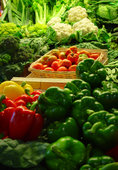 You probably wonder if I practice what I preach, and the answer is that I try. Nobody is perfect in their diet all of the time. I eat out 2-3 meals per week on average, some weeks 5. I belong to a CSA, and supplement with organic produce as much as it is feasible. I buy hormone-free and antibiotic-free meats, and most of the sweets I consume are made at home. I am uncompromising about artificial sweeteners, artificial butter substitutes, and "non-fat, no-cholesterol, processed-cheese-food-product" (note that even the manufacturers don't call this stuff food!!) - I notice the flavor of these non-foods instantly, and find them unpleasant at best. I do not use them in what I cook, and will avoid eating at places where I know they are used. I eat a small amount of chocolate (1-2 squares, NOT BARS!) daily. I drink 1-2 cups of tea most days, and coffee once or twice per week. I enjoy a glass of wine regularly, but rarely drink alcohol to intoxication. I am an enthusiastic and unapologetic carnivore, and I happily eat vegetarian 2-3 dinners per week. I try to stop eating when I am no longer hungry, but do not always succeed - I am a passionate cook and eater, and sometimes the pleasure of the palate overtakes the wisdom of the gut.
You probably wonder if I practice what I preach, and the answer is that I try. Nobody is perfect in their diet all of the time. I eat out 2-3 meals per week on average, some weeks 5. I belong to a CSA, and supplement with organic produce as much as it is feasible. I buy hormone-free and antibiotic-free meats, and most of the sweets I consume are made at home. I am uncompromising about artificial sweeteners, artificial butter substitutes, and "non-fat, no-cholesterol, processed-cheese-food-product" (note that even the manufacturers don't call this stuff food!!) - I notice the flavor of these non-foods instantly, and find them unpleasant at best. I do not use them in what I cook, and will avoid eating at places where I know they are used. I eat a small amount of chocolate (1-2 squares, NOT BARS!) daily. I drink 1-2 cups of tea most days, and coffee once or twice per week. I enjoy a glass of wine regularly, but rarely drink alcohol to intoxication. I am an enthusiastic and unapologetic carnivore, and I happily eat vegetarian 2-3 dinners per week. I try to stop eating when I am no longer hungry, but do not always succeed - I am a passionate cook and eater, and sometimes the pleasure of the palate overtakes the wisdom of the gut.
I know that it will be impossible to do all of these dietary suggestions all of the time while living in 21st century America. Eating this way will cost you more - in dollars for the food and in the time it takes to prepare it. I believe it is worth it to provide the best fuel you can for your body, and I hope it will lead to savings in medical costs in your later years. back to top
Relax!!
 Obsessing about your food will only bind your liver qi and lead to anxiety, so do the best you can with the budget you have. It is usually easier to make a series of small changes rather than try to change everything about your diet at once, and ANY changes in the direction of a whole foods diet and dietary sanity are better than none at all.
Obsessing about your food will only bind your liver qi and lead to anxiety, so do the best you can with the budget you have. It is usually easier to make a series of small changes rather than try to change everything about your diet at once, and ANY changes in the direction of a whole foods diet and dietary sanity are better than none at all.
Most of all, remember that food is your body's fuel and eating is one of the most sensual experiences we have as human beings. Let your food appeal to all of your senses, apply moderation to all things including moderation, and have fun as you nourish yourself! back to top
*DISCLAIMER: Testamonials used on this site are real comments made by people who have worked with us. As with any medical treatment, we cannot guarantee results and individual experiences may vary.
Images of people on this site are used for illustrative purposes only. The models depicted should not be construed to endorse any products or services promoted on this site, nor should they be construed to have any healthcare issues discussed on this site.Copyright © 2001-2017 Eastern Body Therapy. All Rights Reserved.
